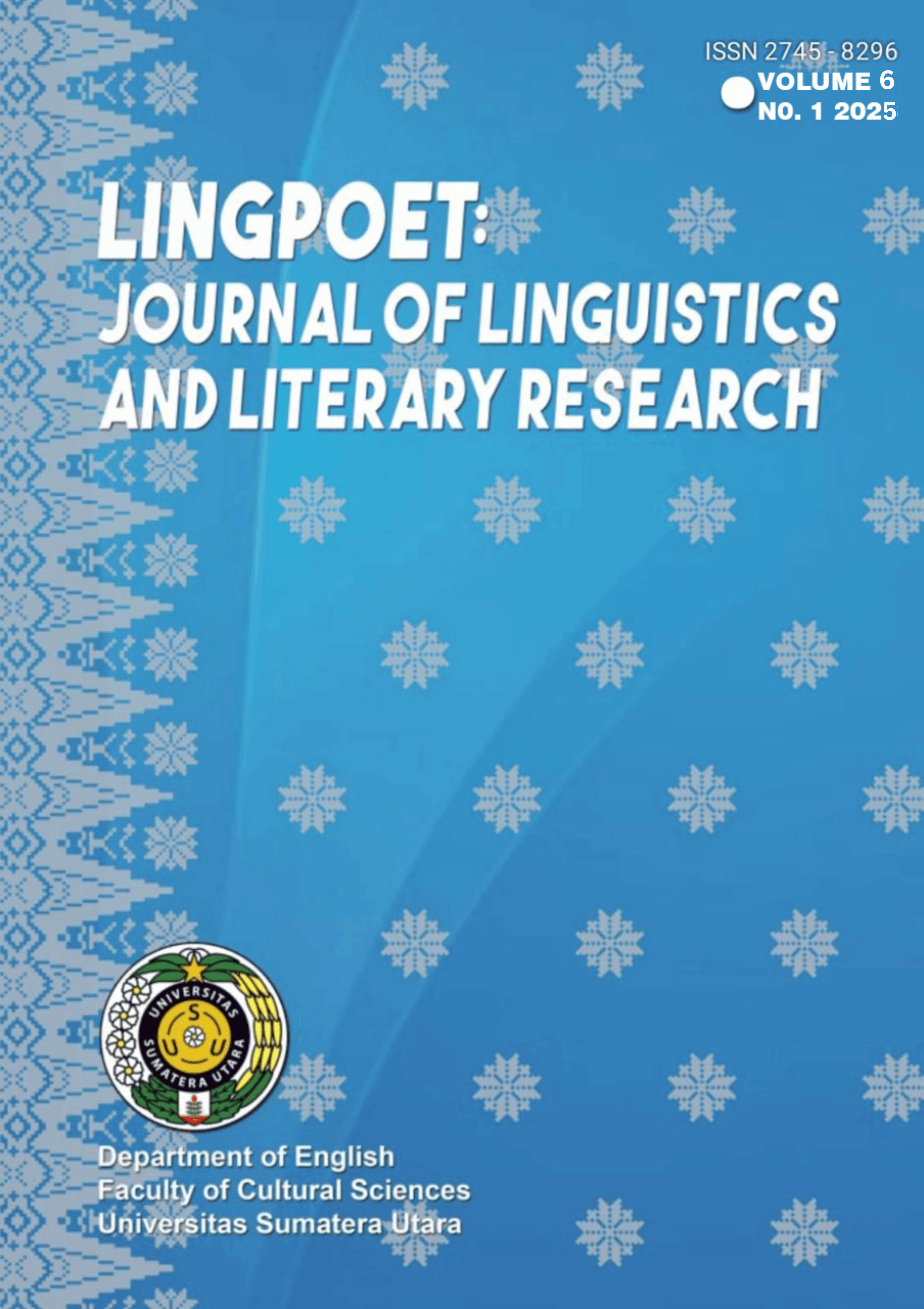“The Perfect Organism”: A Marxist Reading of Expendable Labor in Alien (1979)
Keywords:
Marxist Criticism, Alien (1979), Expendable Labor, Science Fiction Horror, Cultural StudiesAbstract
Ridley Scott’s critically acclaimed 1979 science fiction horror film Alien depicts the struggles of the crew of a spaceship named Nostromo against a murderous alien monster. The film has been interpreted through critical lenses such as feminism (Kuhn, 1990), psychoanalysis (Telotte, 2001), law (Crofts, 2021), and racism (Sobchak, 2001), but there is still room for other interpretations. This paper proposes a Marxist Cultural Studies reading of the film by conducting a close textual analysis of its narrative structure, character dialogue, production design, and cinematography to explore three core Marxist concepts: alienated labor, class conflict, and commodity fetishism. This is extended into an overview of the film’s contemporaneous socio-economic contexts of 1970s America (USA), such as power structure in the industrial economy, employment anxieties, corporate hegemony, in addition to the lasting effects of (Cold) War in the West. Findings show alienation of the Nostromo crew from: 1) their ‘product’ (the murderous alien lifeform they were directed to retrieve); 2) their productive activity (agreement to substandard terms driven only by wage compulsion); 3) their human potential (absence of purpose from labor); 4) other workers (distrust and expendability). The class conflict between the proletariat (the Nostromo crew) and the bourgeoisie (the faceless, inhumane corporation represented by the AI ‘Mother’ ship computer and by extension, the alien) structures the film’s narrative of exploitation and betrayal. And lastly, the alien monster can be interpreted as a fetishized commodity desired by the corporation for its potential value, completely outweighing the value of the crew’s lives. By paralleling these findings with the overview of 1970s America’s socio-economic issues in capitalism, such as distrust of authority and corporate hegemony, possible influences on the film’s themes can be seen. In conclusion, this Marxist critique reveals the film’s portrayal of expendable labor in ways that still resonate with modern audiences despite geopolitical space, facilitating a cross-cultural engagement on timeless and global social issues.
Downloads
References
Althusser, L. (1971). Lenin and philosophy and other essays. Monthly Review Press.
Arnold, D., & Bongiovi, J. R. (2013). Precarious, informalizing, and flexible work: Transforming concepts and understandings. American Behavioral Scientist, 57(3), 289–308. https://doi.org/10.1177/0002764212469359
Becker, S. L. (1984). Marxist approaches to media studies: The British experience. Critical Studies in Mass Communication, 1(1), 66–80. https://doi.org/10.1080/15295038409360014
Bluestone, B., & Harrison, B. (1982). The deindustrialization of America: Plant closings, community abandonment, and the dismantling of basic industry. Basic Books.
Bordwell, D., & Thompson, K. (2017). Film art: An introduction (11th ed.). McGraw-Hill Education.
Creed, B. (1993). The monstrous-feminine: Film, feminism, psychoanalysis. Routledge.
Crofts, T. (2021). Aliens: Legal conceptions of the corporate invasion. Law, Culture and the Humanities, 17(3), 452–467. https://doi.org/10.1177/1743872119840709
Davis, M. (1986). Prisoners of the American dream: Politics and economy in the history of the US working class. Verso.
Dirlik, A. (1994). The postcolonial aura: Third World criticism in the age of global capitalism. Critical Inquiry, 20(2), 328–356. https://doi.org/10.1086/448714
Dobie, A. B. (2024). Theory into practice: An introduction to literary criticism (3rd ed.). Cengage Learning.
Falaiye, R. I. (2025). Commodity fetishism and female agency in The Oyster Princess by Ernst Lubitsch. Journal of Gender Related Studies. https://doi.org/10.47941/jgrs.2549
Freire, P. (2000). Pedagogy of the oppressed (30th anniversary ed.). Continuum. (Original work published 1970)
Friedman, M. (1962). Capitalism and freedom. University of Chicago Press.
Gibbs, J. (2002). Mise-en-scene: Film style and interpretation. Wallflower Press.
Gibson, P. C. (2001). "You've been in my life so long I can't remember anything else": Into the labyrinth with Ripley and the Alien. In A. Kuhn (Ed.), Alien zone II: The spaces of science-fiction cinema (pp. 122-135). Routledge. https://doi.org/10.4324/9780203165195-9
Habermas, J. (1984). The theory of communicative action, Volume 1: Reason and the rationalization of society (T. McCarthy, Trans.). Beacon Press.
Hall, S. (1980). Encoding/decoding. In S. Hall, D. Hobson, A. Lowe, & P. Willis (Eds.), Culture, media, language: Working papers in cultural studies, 1972–79 (pp. 128–138). Hutchinson.
Haraway, D. (1991). Simians, cyborgs, and women: The reinvention of nature. Routledge.
Harvey, D. (2005). A brief history of neoliberalism. Oxford University Press.
Horkheimer, M. (1972). Critical theory: Selected essays (M. J. O’Connell et al., Trans.). Continuum.
Jameson, F. (1981). The political unconscious: Narrative as a socially symbolic act. Cornell University Press.
Judt, T. (2005). Postwar: A history of Europe since 1945. Penguin Press.
Kashindi, R. (2018). Understanding Marxism as a critical study and research paradigm: A framework for a critic in literary analysis. Zenodo. https://doi.org/10.5281/ZENODO.1256405
Kelly, P. F. (2002). Spaces of labour control: Comparative perspectives from Southeast Asia. Transactions of the Institute of British Geographers, 27(4), 395–411. https://doi.org/10.1111/1475-5661.00065
Kincheloe, J. L., & McLaren, P. (2000). Rethinking critical theory and qualitative research. In N. K. Denzin & Y. S. Lincoln (Eds.), Handbook of qualitative research (2nd ed., pp. 279–314). Sage Publications.
Kuhn, A. (Ed.). (1990). Alien zone: Cultural theory and contemporary science fiction cinema. Verso.
Li, T. M. (2011). Centering labor in the land grab debate. The Journal of Peasant Studies, 38(2), 281–298. https://doi.org/10.1080/03066150.2011.559009
Library of Congress. (n.d.). Alien (1979). National Film Registry. Retrieved November 7, 2023, from https://www.loc.gov/programs/national-film-preservation-board/film-registry/complete-national-film-registry-listing/
Lichtenstein, N. (2002). State of the union: A century of American labor. Princeton University Press.
Marcuse, H. (1964). One-dimensional man: Studies in the ideology of advanced industrial society. Beacon Press.
Marx, K. (1867). Capital: A critique of political economy (Vol. 1). Otto Meissner Verlag.
Marx, K. (1978). Theses on Feuerbach. In R. C. Tucker (Ed.), The Marx-Engels reader (2nd ed., pp. 143–145). Norton. (Original work published 1845)
Marx, K., & Engels, F. (1970). The German ideology (C. J. Arthur, Ed.). International Publishers. (Original work published 1846)
Downloads
Published
How to Cite
Issue
Section
License
Copyright (c) 2025 LingPoet: Journal of Linguistics and Literary Research

This work is licensed under a Creative Commons Attribution-ShareAlike 4.0 International License.













